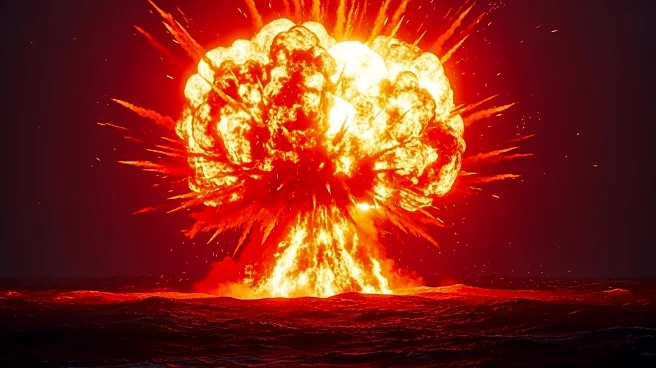What's Happening?
The LPG-laden tanker MV Falcon experienced an explosion off the coast of Yemen, leading to a fire that forced the crew to abandon the vessel. The European Union's naval force, Aspides, reported that the explosion,
likely accidental, resulted in at least 15% of the Cameroon-flagged vessel being engulfed in flames. The tanker, fully loaded with liquefied petroleum gas, poses a significant risk of further explosions. Aspides has advised nearby vessels to maintain a safe distance. An ongoing rescue operation has successfully recovered 24 of the 26 crew members, with two still missing. The MV Falcon was en route from Oman's Sohar Port to Djibouti when the explosion occurred 113 nautical miles southeast of Aden, Yemen. Maritime security sources have ruled out missile or drone involvement, and the tanker does not fit the target profile of Yemen's Houthi militants, who have denied any connection to the incident.
Why It's Important?
The incident highlights the ongoing risks associated with maritime transport in conflict-prone regions. The Red Sea and the Suez Canal are critical shipping routes, and disruptions can have significant implications for global trade. The explosion on the MV Falcon underscores the vulnerability of vessels in these waters, particularly given the history of Houthi attacks in the region. While the Houthis have denied involvement, their past actions have already impacted trade flows, emphasizing the need for heightened security measures. The potential for further explosions from the LPG cargo also poses environmental and safety concerns, necessitating immediate attention from international maritime authorities.
What's Next?
Efforts will likely focus on securing the area and preventing further incidents. The rescue operation will continue to locate the missing crew members. Investigations into the cause of the explosion will be crucial to prevent similar occurrences. The incident may prompt discussions among international maritime organizations to enhance safety protocols and security measures in the region. Additionally, there may be diplomatic engagements to address the broader security challenges posed by regional conflicts affecting maritime routes.










